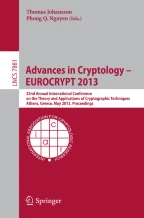Abstract
Assuming solely the existence of one-way functions, we show how to construct Garbled RAM Programs (GRAM) where its size only depends on fixed polynomial in the security parameter times the program running time. We stress that we avoid converting the RAM programs into circuits. As an example, our techniques implies the first garbled binary search program (searching over sorted encrypted data stored in a cloud) which is poly-logarithmic in the data size instead of linear. Our result requires the existence of one-way function and enjoys the same non-interactive properties as Yao’s original garbled circuits.
Patent Pending.
Chapter PDF
Similar content being viewed by others
References
Applebaum, B., Ishai, Y., Kushilevitz, E.: From secrecy to soundness: Efficient verification via secure computation. In: Abramsky, S., Gavoille, C., Kirchner, C., Meyer auf der Heide, F., Spirakis, P.G. (eds.) ICALP 2010. LNCS, vol. 6198, pp. 152–163. Springer, Heidelberg (2010)
Beaver, D., Micali, S., Rogaway, P.: The round complexity of secure protocols (extended abstract). In: STOC, pp. 503–513 (1990)
Bellare, M., Hoang, V.T., Rogaway, P.: Adaptively secure garbling with applications to one-time programs and secure outsourcing. In: Wang, X., Sako, K. (eds.) ASIACRYPT 2012. LNCS, vol. 7658, pp. 134–153. Springer, Heidelberg (2012)
Bellare, M., Hoang, V.T., Rogaway, P.: Foundations of garbled circuits. In: ACM Conference on Computer and Communications Security, pp. 784–796 (2012)
Boneh, D., Kushilevitz, E., Ostrovsky, R., Skeith III, W.E.: Public key encryption that allows PIR queries. In: Menezes, A. (ed.) CRYPTO 2007. LNCS, vol. 4622, pp. 50–67. Springer, Heidelberg (2007)
Boneh, D., Mazieres, D., Popa, R.A.: Remote oblivious storage: Making oblivious RAM practical. CSAIL Technical Report, MIT-CSAIL-TR-2011-018 (2011)
Chandran, N., Ostrovsky, R., Skeith III, W.E.: Public-key encryption with efficient amortized updates. In: Garay, J.A., De Prisco, R. (eds.) SCN 2010. LNCS, vol. 6280, pp. 17–35. Springer, Heidelberg (2010)
Stephen, A.: Cook and Robert A. Reckhow. Time bounded random access machines. Journal of Computer and System Sciences 7(4), 354–375 (1973)
Goldreich, O.: Towards a theory of software protection and simulation by oblivious RAMs. In: STOC, pp. 182–194 (1987)
Goldreich, O., Micali, S., Wigderson, A.: How to play any mental game or a completeness theorem for protocols with honest majority. In: STOC, pp. 218–229 (1987)
Goldreich, O., Ostrovsky, R.: Software protection and simulation on oblivious RAMs. J. ACM 43(3), 431–473 (1996)
Goldwasser, S., Kalai, Y., Popa, R.A., Vaikuntanathan, V., Zeldovich, N.: Succinct functional encryption and applications: Reusable garbled circuits and beyond. Cryptology ePrint Archive, Report 2012/733 (2012)
Michael, T.: Goodrich and Michael Mitzenmacher. Privacy-preserving access of outsourced data via oblivious RAM simulation. In: Aceto, L., Henzinger, M., Sgall, J. (eds.) ICALP 2011, Part II. LNCS, vol. 6756, pp. 576–587. Springer, Heidelberg (2011)
Goodrich, M.T., Mitzenmacher, M., Ohrimenko, O., Tamassia, R.: Oblivious RAM simulation with efficient worst-case access overhead. In: CCSW, pp. 95–100 (2011)
Goodrich, M.T., Mitzenmacher, M., Ohrimenko, O., Tamassia, R.: Privacy-preserving group data access via stateless oblivious ram simulation. In: SODA, pp. 157–167 (2012)
Gordon, S.D., Katz, J., Kolesnikov, V., Krell, F., Malkin, T., Raykova, M., Vahlis, Y.: Secure two-party computation in sublinear (amortized) time. In: ACM Conference on Computer and Communications Security, pp. 513–524 (2012)
Ishai, Y., Kushilevitz, E.: Personal communication (2012)
Kushilevitz, E., Lu, S., Ostrovsky, R.: On the (in)security of hash-based oblivious RAM and a new balancing scheme. In: SODA, pp. 143–156 (2012)
Lindell, Y., Pinkas, B.: A proof of security of yao’s protocol for two-party computation. J. Cryptology 22(2), 161–188 (2009)
Lu, S., Ostrovsky, R.: How to garble RAM programs. Cryptology ePrint Archive, Report 2012/601 (2012)
Lu, S., Ostrovsky, R.: Distributed oblivious RAM for secure two-party computation. In: Sahai, A. (ed.) TCC 2013. LNCS, vol. 7785, pp. 377–396. Springer, Heidelberg (2013)
Naor, M., Nissim, K.: Communication preserving protocols for secure function evaluation. In: STOC, pp. 590–599 (2001)
Ostrovsky, R.: Efficient computation on oblivious RAMs. In: STOC, pp. 514–523 (1990)
Ostrovsky, R.: Software Protection and Simulation On Oblivious RAMs. PhD thesis, Massachusetts Institute of Technology, Dept. of Electrical Engineering and Computer Science (June 1992)
Ostrovsky, R., Shoup, V.: Private information storage (extended abstract). In: STOC, pp. 294–303 (1997)
Pinkas, B., Reinman, T.: Oblivious RAM revisited. In: Rabin, T. (ed.) CRYPTO 2010. LNCS, vol. 6223, pp. 502–519. Springer, Heidelberg (2010)
Pippenger, N., Fischer, M.J.: Relations among complexity measures. J. ACM 26(2), 361–381 (1979)
Shi, E., Chan, T.-H.H., Stefanov, E., Li, M.: Oblivious RAM with O((logN)3) Worst-case Cost. In: Lee, D.H., Wang, X. (eds.) ASIACRYPT 2011. LNCS, vol. 7073, pp. 197–214. Springer, Heidelberg (2011)
Stefanov, E., Shi, E., Song, D.: Towards practical oblivious RAM. In: NDSS (2012)
Wichs, D.: Personal Communication (March 2013)
Williams, P., Sion, R.: Single Round Access Privacy on Outsourced Storage. In: ACM CCS, pp. 293–304 (2012)
Williams, P., Sion, R., Carbunar, B.: Building castles out of mud: practical access pattern privacy and correctness on untrusted storage. In: ACM Conference on Computer and Communications Security, pp. 139–148 (2008)
Yao, A.C.-C.: Protocols for secure computations (extended abstract). In: FOCS, pp. 160–164 (1982)
Author information
Authors and Affiliations
Editor information
Editors and Affiliations
Rights and permissions
Copyright information
© 2013 International Association for Cryptologic Research
About this paper
Cite this paper
Lu, S., Ostrovsky, R. (2013). How to Garble RAM Programs?. In: Johansson, T., Nguyen, P.Q. (eds) Advances in Cryptology – EUROCRYPT 2013. EUROCRYPT 2013. Lecture Notes in Computer Science, vol 7881. Springer, Berlin, Heidelberg. https://doi.org/10.1007/978-3-642-38348-9_42
Download citation
DOI: https://doi.org/10.1007/978-3-642-38348-9_42
Publisher Name: Springer, Berlin, Heidelberg
Print ISBN: 978-3-642-38347-2
Online ISBN: 978-3-642-38348-9
eBook Packages: Computer ScienceComputer Science (R0)
